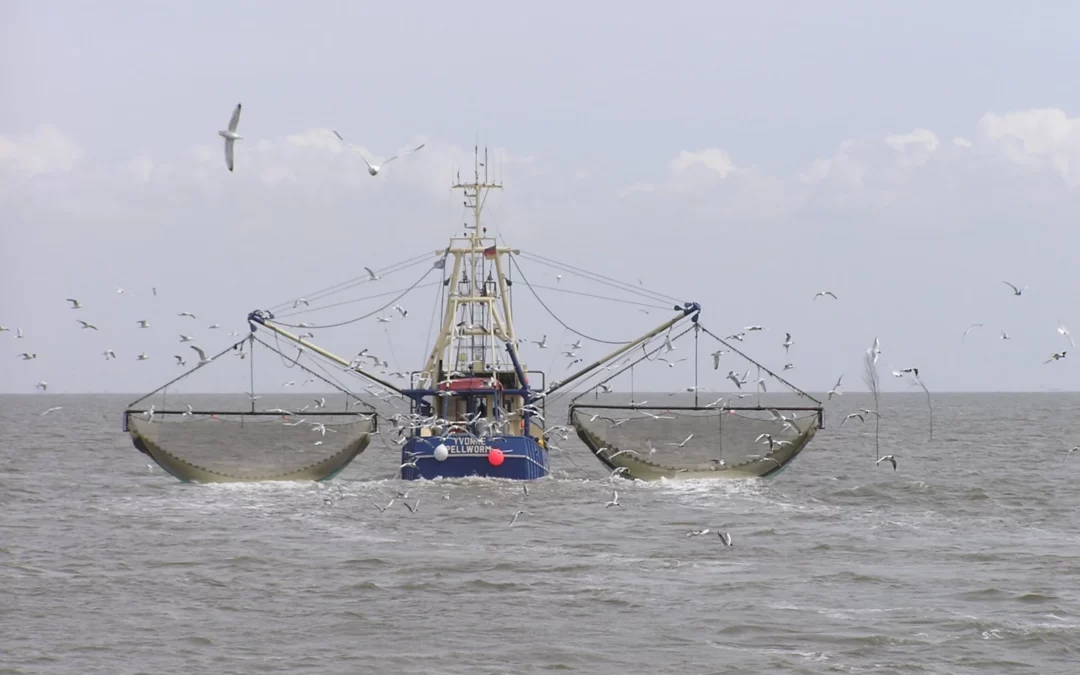
by Barani Chettiar | Apr 8, 2024 | Uncategorized
The open sea serves as both a livelihood and a challenge for commercial fishing operations. In this dynamic and often unpredictable environment, effective communication is not just a convenience but a necessity. Marine radio networks and channels play a pivotal role in enhancing the efficiency, safety, and overall success of commercial fishing endeavors. In this article, we explore the various benefits of leveraging marine radio networks in the context of commercial fishing operations.
Importance of Communication at Sea
Effective communication at sea is the backbone of successful commercial fishing operations. The ability to convey critical information, coordinate activities, and respond promptly to changing conditions is paramount. Marine radio networks provide a reliable means of communication, enabling vessels to stay connected over vast distances, even in challenging maritime conditions.
Efficiency through Real-Time Information Exchange
One of the primary benefits of marine radio networks in commercial fishing is the facilitation of real-time information exchange. Vessels can share valuable data about fishing grounds, weather conditions, and catch updates instantly. This timely exchange of information allows for informed decision-making, optimizing fishing strategies, and adapting to evolving situations, ultimately enhancing operational efficiency.
Safety and Emergency Response Enhancements
Safety is a top priority in commercial fishing, where the inherent risks of the sea demand proactive measures. Marine radio networks offer a crucial lifeline for emergency communication. In distress situations or unforeseen challenges, vessels can swiftly transmit distress signals, ensuring a rapid and coordinated response from nearby vessels or maritime authorities. This capability enhances overall safety and contributes to the swift resolution of emergencies.
Coordination for Resource Management
Commercial fishing operations often involve multiple vessels working in proximity. Marine radio networks facilitate seamless coordination among these vessels. Captains and crews can communicate about their activities, share information on fishing yields, and coordinate movements to avoid conflicts. This collaborative approach to resource management fosters a more sustainable and organized approach to commercial fishing.
Compliance with Regulations and Guidelines
In the maritime industry, adherence to regulations and guidelines is imperative for the safety of vessels, crew members, and the marine ecosystem. Marine radio networks ensure compliance with communication protocols and standards set by maritime authorities. This includes using the appropriate radio channels, adhering to frequency regulations, and following emergency communication procedures mandated by international maritime organizations.
Cost Savings and Improved Productivity
Effective communication through marine radio networks contributes to cost savings and improved productivity in commercial fishing operations. By streamlining coordination, vessels can optimize their routes, share information about favorable fishing grounds, and adjust strategies based on real-time insights. This results in reduced fuel consumption, enhanced catch efficiency, and overall improved productivity.
Maximizing Efficiency and Safety at Sea
In conclusion, the benefits of marine radio networks and channels for commercial fishing operations are multifaceted. From ensuring efficient real-time communication and enhancing safety and emergency response capabilities to facilitating coordinated resource management, these networks are indispensable tools on the open sea. Compliance with regulations and guidelines, coupled with the potential for cost savings and increased productivity, further underscores their significance in the commercial fishing industry. As technology continues to advance, leveraging marine radio networks becomes an integral part of maximizing efficiency and safety, allowing commercial fishing operations to navigate the challenges of the sea with confidence and success.
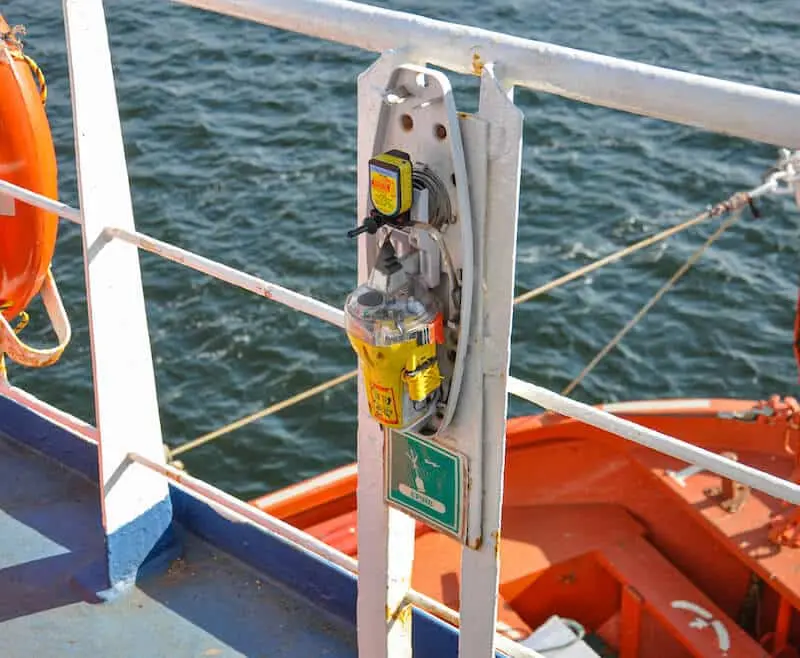
by Barani Chettiar | Apr 6, 2024 | Uncategorized
Overview of EPIRBs in the Marine Industry
In the vast expanse of the open seas, safety is of paramount concern for commercial marine operations. One critical tool that plays a pivotal role in ensuring the safety of vessels and their crews is the Emergency Position-Indicating Radio Beacon (EPIRB). This article provides an in-depth understanding of EPIRBs, their functions, types, compliance with regulations, the activation process, and the overall importance of these devices in the realm of commercial marine operations.
What are EPIRBs: Function and Purpose
EPIRBs are specialized distress beacons designed to alert search and rescue authorities in the event of an emergency at sea. These compact and rugged devices are equipped with a satellite transmitter that, when activated, broadcasts a distress signal to orbiting satellites. The primary purpose of EPIRBs is to facilitate rapid and accurate location identification of distressed vessels, ensuring timely assistance and rescue operations.
Types of EPIRBs: Category Overview
There are two main categories of EPIRBs – Category I and Category II – each designed to meet specific needs and vessel types.
Category I EPIRBs: These EPIRBs are designed to automatically float free from a sinking vessel and activate upon immersion in water. Equipped with a hydrostatic release mechanism, Category I EPIRBs ensure swift deployment, making them ideal for vessels that may sink rapidly.
Category II EPIRBs: Category II EPIRBs are manually activated and are typically installed in a bracket on a vessel. These devices are suitable for vessels that are less prone to rapid sinking, allowing crew members to initiate distress signals when necessary.
Regulations and Requirements: Compliance for Commercial Use
The use of EPIRBs in commercial marine operations is subject to stringent regulations and requirements set forth by international maritime organizations. The International Maritime Organization (IMO) mandates the installation and proper maintenance of EPIRBs on certain vessels to enhance safety and expedite search and rescue efforts. Commercial vessels are required to have EPIRBs that comply with the Global Maritime Distress and Safety System (GMDSS) regulations, ensuring a standardized approach to distress alerting.
Activation and Transmission Process: How it Works
The activation and transmission process of EPIRBs is designed to be straightforward and efficient, ensuring quick distress signal dissemination. When activated, the EPIRB initiates a distress signal that is transmitted via satellite to search and rescue authorities. This signal contains vital information, including the unique identifier of the EPIRB, the vessel’s identity, and its precise location through GPS technology. Search and rescue teams can then respond promptly to the distress call, improving the chances of a successful outcome in emergency situations.
Benefits of Using EPIRBs: Importance for Safety
The importance of EPIRBs in ensuring the safety of commercial marine operations cannot be overstated. Here are key benefits:
Rapid Distress Alerting: EPIRBs enable rapid and efficient alerting of distress situations, reducing response time and increasing the likelihood of successful search and rescue operations.
Accurate Location Identification: GPS-equipped EPIRBs provide precise location information, allowing search and rescue authorities to pinpoint the distressed vessel’s position quickly and accurately.
Compliance with Regulations: The use of EPIRBs ensures compliance with international regulations, contributing to a standardized approach to maritime safety and distress alerting.
Versatility for Different Vessel Types: The availability of Category I and Category II EPIRBs caters to the diverse needs of commercial vessels, ensuring that different types of vessels can benefit from this crucial safety technology.
Importance of EPIRBs in Marine Operations
In conclusion, EPIRBs are indispensable tools for ensuring the safety of commercial marine operations. By complying with international regulations and utilizing these distress beacons, vessels enhance their emergency response capabilities, improve location accuracy during distress situations, and contribute to a safer maritime environment. As a critical component of the broader safety infrastructure, EPIRBs play a pivotal role in mitigating risks and facilitating timely assistance in emergencies at sea. Commercial marine operations must prioritize the adoption and proper maintenance of EPIRBs to navigate the waters with confidence and safeguard the well-being of crews and vessels alike.
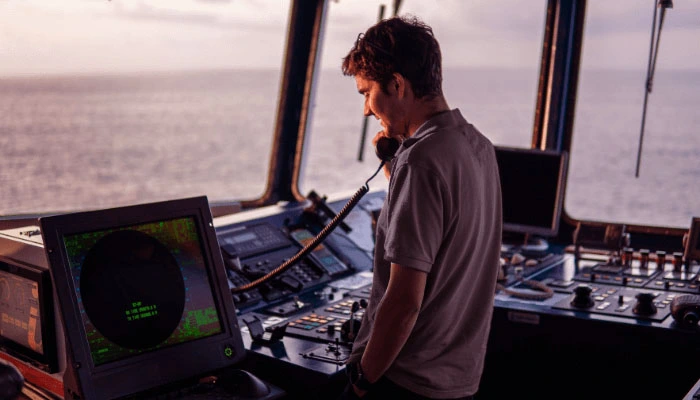
by Barani Chettiar | Apr 5, 2024 | Uncategorized
In the challenging and unpredictable environment of the open sea, reliable communication is the lifeline for commercial fishermen. A crucial tool in their arsenal is the marine radio, a device that transcends mere communication by providing safety, coordination, and a sense of security. This guide aims to assist commercial fishermen in making informed decisions when choosing the right marine radio, exploring types, essential features, regulations, top recommendations, and maintenance tips.
Importance of Marine Radios in the Fishing Industry
The fishing industry demands effective communication for successful operations, safety, and emergency response. Marine radios serve as a vital means of connecting vessels, coordinating activities, and ensuring that crucial information is conveyed swiftly and accurately. In the vast expanses of open water, the significance of reliable communication cannot be overstated.
Types of Marine Radios: VHF vs. MF/HF Radios
VHF Radios:
- Frequency: Very High Frequency (VHF) radios are commonly used for short-range communication.
- Range: Ideal for coastal and inland waters, with a typical range of up to 25 nautical miles.
- Advantages: Clear communication, less affected by atmospheric conditions, and widely adopted in the maritime community.
MF/HF Radios:
- Frequency: Medium Frequency (MF) and High Frequency (HF) radios are suitable for long-range communication.
- Range: Capable of long-distance communication, making them valuable for offshore and long-haul fishing operations.
- Advantages: Extended range, especially in areas with limited VHF coverage, and global communication capabilities.
Features to Consider
Waterproofing:
- Essential for marine radios due to exposure to water, spray, and adverse weather conditions.
- Look for radios with robust waterproofing standards, ensuring durability in the marine environment.
Range:
- Assess the operational range of the radio based on the fishing areas you frequent.
- Consider the topography of the waters you navigate and select a radio with an appropriate range to meet your communication needs.
Extra Functions:
- Some marine radios come equipped with additional features such as built-in GPS, Digital Selective Calling (DSC), and Automatic Identification System (AIS).
- Evaluate the extra functions based on your specific requirements and the nature of your fishing operations.
Regulations and Compliance
Safety Requirements for Commercial Fishermen:
- Familiarize yourself with local and international regulations governing marine radio usage.
- Ensure compliance with safety standards, including the carriage of required communication equipment on board.
Best Marine Radios for Fishing
Considering the diverse needs of commercial fishermen, several reputable brands and models stand out:
Icom M506:
- VHF radio with integrated AIS receiver for enhanced safety.
- Intuitive user interface and large display for easy operation.
Standard Horizon GX2200:
- VHF radio with built-in GPS and DSC functionality.
- Compact design with a variety of scanning options.
Furuno FS1575:
- MF/HF radio designed for long-range communication.
- Robust construction suitable for offshore and deep-sea fishing.
Maintenance Tips
Keeping Your Radio in Top Condition:
- Regularly inspect and clean the radio and its components, paying attention to connectors and antennas.
- Test the functionality of waterproof seals and replace them if damaged.
- Follow the manufacturer’s guidelines for software updates and firmware maintenance.
Conclusion
In the vast and challenging expanse of the open sea, choosing the right marine radio is not just a matter of convenience but a critical decision that can impact the safety and success of commercial fishermen. Whether navigating coastal waters or venturing into the deep sea, a reliable and well-maintained marine radio ensures seamless communication, emergency response capabilities, and adherence to safety regulations. By understanding the types of marine radios, essential features, compliance requirements, and exploring top recommendations, commercial fishermen can make informed choices that contribute to the overall efficiency and safety of their operations. In the maritime world, the importance of reliable communication at sea cannot be overstated, making the selection of the right marine radio an indispensable aspect of a successful fishing venture.
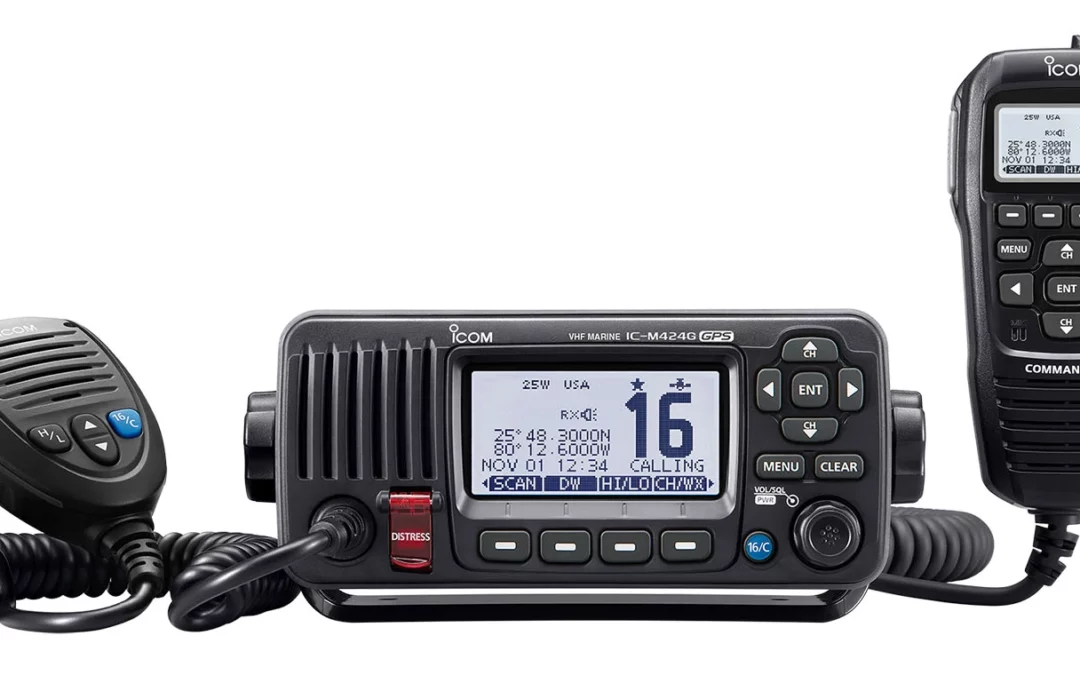
by Barani Chettiar | Apr 4, 2024 | Uncategorized
Importance of GPS in Marine Communication
In the vast expanse of the open sea, where precision and reliability are paramount, the integration of Global Positioning System (GPS) technology into marine radio systems has revolutionized communication and navigation for seafarers. In this article, we delve into the multifaceted advantages of GPS integration, ranging from enhanced navigation to improved safety features, efficiency gains, communication enhancements, and positive environmental impacts.
Enhanced Navigation: Improving Accuracy and Reliability
The cornerstone of effective maritime communication lies in precise navigation. GPS integration in marine radio systems offers unparalleled accuracy in determining a vessel’s position, ensuring that captains and navigators can plot their course with confidence. Unlike traditional navigation methods that rely on charts and celestial navigation, GPS provides real-time information, significantly reducing the margin of error. This enhanced accuracy not only improves overall navigation but also aids in avoiding obstacles, optimizing routes, and ensuring vessels stay on course even in adverse weather conditions.
Safety Features: Emergency Response Capabilities
In emergency situations at sea, time is often the critical factor between a successful response and a potential disaster. GPS integration equips marine radio systems with emergency response capabilities that can be a game-changer in distress situations. When a distress call is transmitted over the radio, the embedded GPS coordinates are automatically included, allowing swift and precise identification of the distressed vessel’s location. This feature streamlines search and rescue operations, ensuring that help arrives at the right place in the shortest possible time.
Efficiency and Cost Savings: Optimal Route Planning
Efficiency in maritime operations is not just about speed but also about the optimal use of resources. GPS integration enables vessels to plan routes with precision, taking into account factors such as current weather conditions, sea currents, and traffic patterns. By selecting the most efficient routes, vessels can reduce fuel consumption, cut down on travel time, and ultimately realize substantial cost savings. This level of route optimization goes beyond traditional navigation methods, showcasing the economic benefits of GPS integration in marine radio systems.
Communication Enhancement: Real-Time Updates and Coordination
In the dynamic environment of the open sea, effective communication is key to safe and coordinated operations. GPS integration enhances communication by providing real-time updates on the positions of multiple vessels. Captains and crews can share their precise locations, intentions, and status, fostering a collaborative and informed approach to navigation. This level of real-time coordination reduces the risk of collisions, streamlines traffic in busy maritime areas, and enhances overall situational awareness for all vessels involved.
Environmental Impact: Reduced Fuel Consumption
Beyond the operational advantages, GPS integration in marine radio systems contributes to a more sustainable maritime industry. By enabling optimal route planning, vessels can minimize fuel consumption and, consequently, reduce their carbon footprint. The environmental impact of reduced fuel consumption is significant, aligning with global efforts to promote eco-friendly practices in all industries, including maritime. GPS-equipped marine radio systems play a role in fostering a more environmentally conscious approach to navigation and vessel management.
Advantages of Integrating GPS in Marine Radios
In the ever-evolving landscape of maritime technology, the integration of GPS into marine radio systems stands as a transformative development. From enhanced navigation and safety features to efficiency gains, communication enhancements, and positive environmental impacts, the benefits are far-reaching. Vessels equipped with GPS-integrated marine radio systems not only navigate with unprecedented accuracy but also contribute to safer, more efficient, and environmentally conscious maritime practices. As the maritime industry continues to embrace technological advancements, the integration of GPS in marine radio systems remains a beacon of progress, ensuring that vessels traverse the seas with precision, safety, and environmental responsibility.
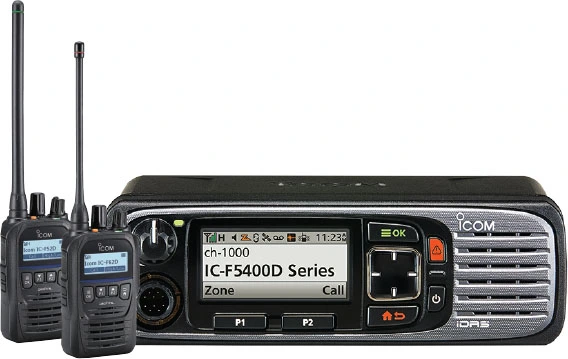
by Barani Chettiar | Apr 3, 2024 | Uncategorized
In the ever-evolving world of maritime communication, digital radio systems have emerged as powerful tools for enhancing connectivity, safety, and operational efficiency in commercial marine applications. In this blog, we’ll explore the numerous benefits that digital radio systems offer to commercial vessels, from improved communication clarity to enhanced safety features and regulatory compliance.
Enhanced Communication: Clarity and Coverage Improvement
One of the primary advantages of digital radio systems in commercial marine applications is their ability to deliver enhanced communication clarity and coverage. Unlike traditional analog systems, digital radios offer superior audio quality, free from the static, interference, and distortion often associated with analog transmissions. This ensures clear and reliable communication between crew members, vessel operators, and shore-based stations, even in challenging environmental conditions or over long distances.
Digital radio systems also provide extended coverage ranges, allowing vessels to communicate effectively over larger geographic areas without experiencing signal degradation. This extended coverage is particularly beneficial for vessels operating in remote or offshore regions where traditional communication methods may be limited.
Safety Features: Automatic Distress Signals, GPS Integration
Safety is paramount in the maritime industry, and digital radio systems offer several advanced features designed to enhance safety at sea. One such feature is the automatic distress signal capability, which allows vessels to transmit distress alerts automatically in the event of an emergency. These distress signals include crucial information such as the vessel’s identity, location, and nature of the emergency, facilitating swift and coordinated rescue operations.
Furthermore, many digital radio systems offer integrated GPS functionality, enabling vessels to transmit their precise location information along with distress signals. This integration enhances the accuracy and effectiveness of search and rescue efforts by providing rescuers with real-time information about the vessel’s location, thereby reducing response times and increasing the likelihood of successful outcomes in emergency situations.
Efficiency in Operations: Real-time Data Transmission
Digital radio systems facilitate efficient and streamlined operations in commercial marine settings by enabling real-time data transmission and communication. Crew members can quickly and easily share information, coordinate tasks, and respond to changing conditions without delays or interruptions. This real-time communication capability is particularly valuable for vessels engaged in time-sensitive operations such as cargo shipping, fishing, or offshore support services, where prompt decision-making and action are essential for success.
Additionally, digital radio systems support the transmission of data beyond voice communication, allowing vessels to exchange vital operational information, navigational data, and weather updates in real-time. This data exchange capability enhances situational awareness, enables proactive decision-making, and contributes to overall operational efficiency and productivity.
Cost-effectiveness: Reduced Maintenance and Downtime Costs
While the initial investment in digital radio systems may be higher than traditional analog systems, they offer significant cost savings over the long term. Digital radios require less maintenance compared to analog counterparts, as they are less susceptible to wear and tear, signal degradation, and component failure. This reduces maintenance expenses and downtime associated with repairs, replacements, and system upgrades, resulting in lower overall operating costs for vessel owners and operators.
Furthermore, the enhanced reliability and performance of digital radio systems contribute to increased operational uptime, reducing the risk of communication failures and associated losses due to missed opportunities, delays, or disruptions in service.
Regulatory Compliance: Meeting Industry Standards and Requirements
In today’s highly regulated maritime environment, compliance with industry standards and regulatory requirements is essential for vessel operators. Digital radio systems are designed to meet and exceed stringent regulatory standards set forth by organizations such as the International Maritime Organization (IMO), the Federal Communications Commission (FCC), and other regulatory bodies.
By investing in digital radio systems that comply with industry standards and regulations, vessel operators can ensure that their communication infrastructure meets the necessary safety, security, and operational requirements, minimizing the risk of regulatory violations, fines, or penalties.
Advantages of Digital Radios in Marine Settings
In conclusion, digital radio systems offer a multitude of benefits for commercial marine applications, ranging from enhanced communication clarity and coverage to advanced safety features, operational efficiency, cost-effectiveness, and regulatory compliance. By leveraging the capabilities of digital radio systems, vessel operators can improve communication reliability, enhance safety, streamline operations, reduce costs, and maintain compliance with industry standards and regulations. As the maritime industry continues to evolve, digital radio systems will play an increasingly important role in shaping the future of communication and connectivity at sea.





